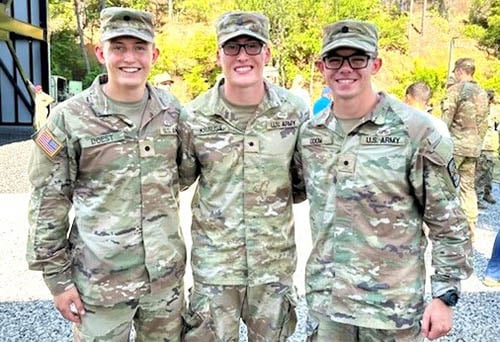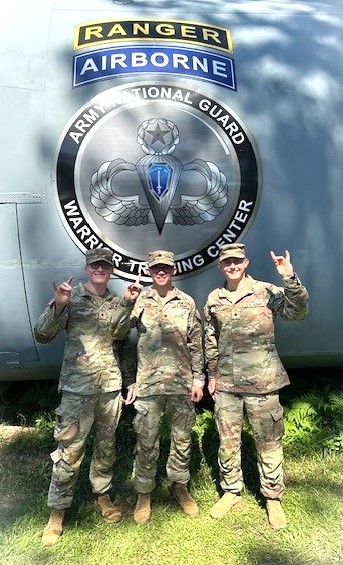
Matthew Krauss was physically and mentally worn down in the stifling Georgia humidity with 2 ½ miles left on the most grueling test of his life, only to find enough strength to join Grand Canyon University classmates Ethan Doest and Louis Odom.
“You keep telling yourself, ‘I got to keep pushing through,'" Krauss said. “The biggest thing was keeping my faith in God, trusting Him and asking Him for strength.”
Doest saw Krauss toward the latter stages of the Air Assault Course, a 12-mile ruck march in which select ROTC cadets must finish the arduous walk while carrying a full-combat load – at least 35 pounds of gear – in less than three hours. It's the final physical test to graduate from the course at the Army National Guard Warrior Training Center in Fort Moore, Georgia, and earn their Air Assault Badges.
Without saying a word to each other, Krauss mustered enough strength to complete the march with less than three minutes to spare.
“We stuck together, helping each other study,” Krauss said of the 11-day training course, in which less than 50% of cadets graduate. “I knew that going back to GCU in the fall, I needed to try and do this for everyone because they sent me there.
“I wanted to prove I was put there for a reason, and I wanted to be there and make sure they chose the right person to go.”
The Air Assault Course prepares soldiers for air mobile operations and includes combat assault, rappelling, sling load tests, physical fitness, and both written and hands-on examinations. Even before they're accepted into training, students must complete an obstacle course and 2-mile run in less than 18 minutes.
And cadets are allowed to fail a test only once.
“The course focuses on an immense amount of attention to detail at every step, and their graduation and earning of their Air Assault Wings brings great credit among themselves, the ROTC program and Grand Canyon University,” Master Sgt. Jamie K. Weaver, senior military science instructor for the GCU and Arizona State programs, wrote in an email.
Weaver described the Army Air Assault School as a “premier training opportunity available to the most qualified cadets across the country.”
Krauss failed the A-22 cargo bag load, part of the sling load operation, in which soldiers load and secure a pallet so it can be attached to a helicopter's cargo hook and transported by air.
He blamed his impatience, which caused him to miss a few pieces.
“You have to look for deficiencies,” Doest said. “There are a lot of small details you've got to catch. Lots of stress going on.”

Doest and Odom waited in the barracks for several hours while Krauss studied and passed the test on the second attempt.
That all three GCU cadets are now qualified to conduct air mobile and air assault helicopter operations is a huge source of pride.
“Especially since GCU doesn’t get a lot of air assault (training) spots,” Odom said. “Usually they go to ASU. We got the majority of the spots and all of us passed, which was huge.
“It’s very good for our program. It shows we produce good cadets, and it’s super nice because I’m friends with the other guys who went, and we were supporting each other during the whole thing. It’s awesome to graduate together.”
The GCU cadets showed they had the discipline it took to pass the physical tests.
Doest, who lives in Mesa, said he studied as much information as he could on the flight from Phoenix to Georgia. The study sessions for combat assault and slingload operations (upon completion of combat assault training) continued nightly with Krauss and Odom when their daily training sessions ended.
“We’d get a handbook and see some PowerPoint presentations,” said Odom, who said the study sessions would last until bedtime. “You had to know the handbook.”
Krauss recalled freezing during a written exam, only for an instructor to tell him, “Trust your intuition. Trust your gut.”
“That was the biggest thing,” Krauss said.
As for conditioning, Krauss, Doest and Odom held their own among a group of about 200 – including a few cadets that were treated for heat stroke despite officers emphasizing to cadets to hydrate properly.
All three described the 12-mile ruck as brutal.
“It felt like it was uphill the entire way, except for a half-mile section,” said Krauss, who cramped around the nine-mile mark.
The humidity caught up to Doest, whose three-liter canteen of water and electrolyte bottle were empty with more than two miles to go. He also remembered that his brother, Nathan, posted the fastest ruck march in his class two years ago.
“I slowed down and saw that Matt was right behind me,” Doest said. “We walked the last two miles together. He was hurting badly. I was very impressed that he kept going.”
The 12-mile ruck was the final and most demanding of the physical tests.
Throughout the training, cadets could be asked to have their ruck sack inspected with no advance notice, with every item in usable condition and placed in a specific manner.
“A lot of people aren’t accountable with their gear, so that’s what happens – you get dropped,” Doest said. “They would put us in a field and tell us to dump our ruck and repack.”
Since graduating from air assault training, each GCU cadet is spending the remainder of the summer in numerous ways. Krauss, a criminal justice major, is staying in his native Massachusetts.
Doest, a mechanical engineering major, took a vacation with his family and fiancée to Newport Beach, California. He works for a family friend’s landscaping business, in addition to serving customers in his knife-sharpening business.
Odom, a business management major, is working for a construction company about an hour away from his San Jose, California, home.
“It’s definitely good money but hard work,” Odom said.
The trio is lined up to graduate from GCU in the spring of 2026, but their graduation from air assault training will be treasured for a long time.
“We didn’t want to see any of us fall out," Odom said. “We all wanted to graduate together. Having each other helped us push each other through.”
GCU News Senior Writer Mark Gonzales can be reached at [email protected]
***
Related content:
GCU News: Officer, newly commissioned at GCU, carries on family's military tradition
GCU News: GCU's ROTC program celebrates milestone growth
GCU News: ROTC cadets answer early call to honor 9/11 victims



































































